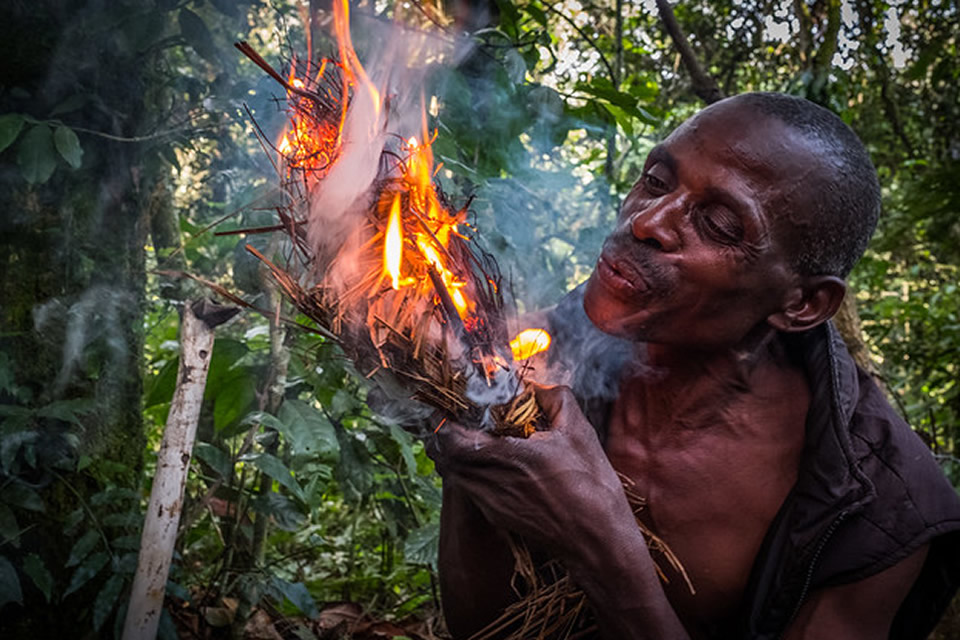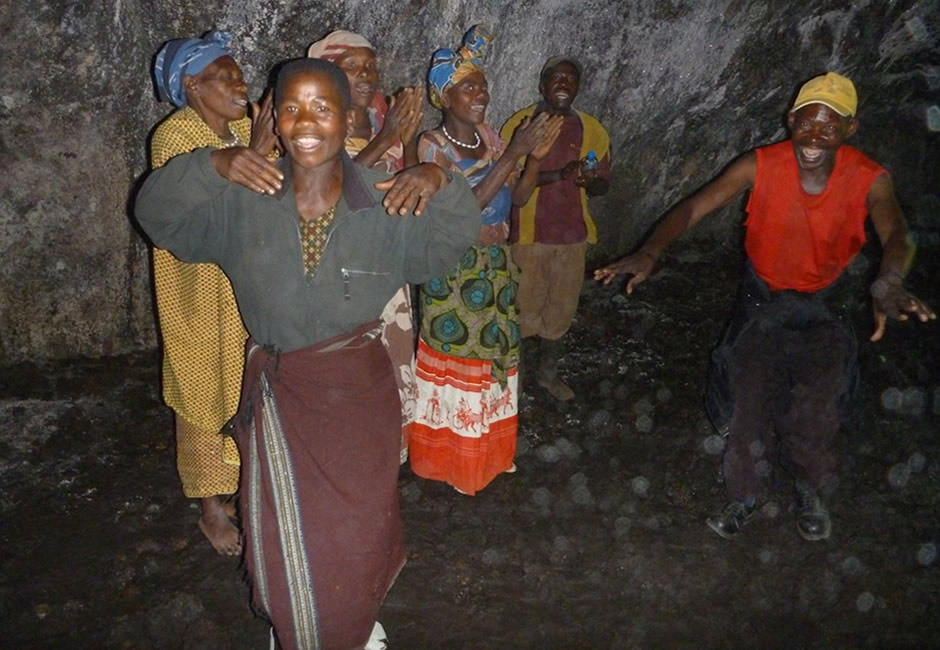Originally, The Batwa were forest-dwelling hunters and gatherers based in the Great Lakes region of Central Africa and the first inhabitants of the African forests. The establishment of the Bwindi and Mgahinga National Parks for Mountain Gorillas in 1991 enabled the authorities to evict the Batwa definitely from the forest. In 1992, the lives of the Batwa changed forever, when the forest became a national park and world heritage site in order to protect the endangered mountain gorillas that reside within its boundaries. The Batwa were evicted from the park and became conservation refugees in a world that was very unfamiliar to them. Their skills and means of subsistence were not useful in this modern environment and they began to suffer.
The Batwa, often called the “keepers of the forest,” are one of Africa’s oldest indigenous tribes. With a history dating back thousands of years, they are believed to be among the first inhabitants of the equatorial forests in what is now Uganda, Rwanda, Burundi, and the Democratic Republic of Congo. Traditionally, the Batwa lived as hunter-gatherers, relying on the dense forests for food, shelter, and medicine.
In Uganda, the Batwa primarily resided in the Bwindi Impenetrable Forest and Mgahinga Gorilla National Park. These rainforests were more than just a home; they were the core of their cultural identity and spiritual beliefs. They saw the forest as a sacred sanctuary, treating its flora and fauna with reverence.
However, their way of life was always dynamic. The Batwa developed a deep knowledge of the ecosystem, crafting a sustainable existence that allowed them to coexist harmoniously with their environment. Their unique skills in tracking, foraging, and traditional medicine were passed down orally through generations, making them living encyclopedias of forest knowledge.
Despite their ancient heritage, the Batwa have faced tremendous challenges in preserving their identity and lifestyle, particularly in the modern era. Today, they are recognised as a vital piece of Uganda’s cultural and historical mosaic, offering tourists a glimpse into an extraordinary way of life that is rapidly disappearing.
Who are the Batwa
The Batwa are the original people of the rain forest and have become conservation refugees evicted from their traditional hunting and gathering grounds which are the rain forests of Uganda and Rwanda. The Batwa people have their own creation story, in it there creator gave some people height, others land but when he got to the Batwa, there were no more such gifts, and he gave them the rain forests. So when they were evicted by the government in the 1990, they felt God had rejected them.
By visiting the Batwa people, you are helping to keep these people, traditions and their culture alive. You are as well providing income, infrastructure, and giving support to the neglected and maligned first people of the forest. The Batwa people are the original people of the forest who were the first inhabitants of the rain forests of Rwanda, Uganda and Burundi. These lived gathered and hunted in the rain forest for over 500,000 years there was no farming, there was no destruction of the forest, no charcoal making, their shelters did not disturb the environment, these lived in harmony with their beloved forests, wildlife including the gorillas and left a low environmental foot print behind them.
The Batwa led a simple and harmonious way of life with nature without farming, livestock keeping; these relied on the forest for their existence only taking what was needed. There is a Batwa saying “A Mutwa (Singular Batwa) loves the forest as much as he loves his own body.” Many of the people in Uganda call them conservationists, killers of gorillas, yet these have not even killed nor eaten any gorillas, but instead , they have co-existed with them for many centuries. Any Gorilla Hunting that the Batwa did was done so at the instigation of others after their eviction and where money was used as an incentive.
Strong Connection to the Forest
For the Batwa, the forest is a source of sustenance, a spiritual haven and the foundation of their cultural identity. Traditionally, the Batwa lived in symbiosis with Uganda’s rainforests, particularly the Bwindi Impenetrable Forest and Mgahinga Gorilla National Park. These dense forests were their home and source of life, providing everything from food to medicine.
The Batwa’s survival skills were honed over millennia. They were expert hunters, using bows and arrows to catch small game, and skilled foragers, identifying edible plants, roots, and fruits with uncanny precision. Every aspect of their existence was intricately tied to the ecosystem. For instance, they crafted homes from tree branches and leaves, creating temporary shelters with minimal environmental impact.
Beyond their practical relationship with the forest, the Batwa regarded it as sacred. Their spiritual practices often involved rituals performed deep within the woods, honouring the spirits they believed governed the land. They also had specific taboos and traditions to preserve the delicate balance of the forest.
The Batwa’s deep connection to the environment offers a stark contrast to modern approaches to resource use. Their practices showcase sustainable living, emphasising respect and coexistence with nature. This intimate bond with the forest is a crucial part of their identity and makes their culture unique and fascinating to explore.
The Batwa’s Struggles
The Batwa’s harmonious relationship with the forest was disrupted in the 1990s when conservation efforts reshaped their world. To protect Uganda’s critically endangered mountain gorillas and their habitat, the government declared the Bwindi Impenetrable Forest and Mgahinga Gorilla National Park as protected areas. This decision, though vital for biodiversity conservation, resulted in the forced eviction of the Batwa from the only home they had ever known.
The displacement was swift and devastating. With no legal ownership of the land they had occupied for centuries, the Batwa received no compensation or alternative housing. Stripped of their access to the forest, they lost their primary source of food, shelter, and spiritual solace. For a community deeply intertwined with their environment, this displacement was not just physical but also cultural and psychological.
In their new reality, the Batwa were marginalised, often settling on the fringes of society in poverty-stricken conditions. Their traditional skills as hunter-gatherers held little value in an economy driven by agriculture and commerce. Furthermore, their cultural practices, oral traditions, and ecosystem knowledge began to erode without access to the forest.
Yet, the story of the Batwa is one of resilience. Over the years, advocacy groups, NGOs, and local communities have worked to empower the Batwa by providing education, healthcare, and opportunities to integrate into modern Ugandan society. Cultural tourism, mainly through experiences like the Batwa Trail, has also emerged as a lifeline, allowing them to share their heritage while earning income.
Despite these efforts, the Batwa continue to face numerous challenges, including land insecurity, discrimination, and loss of cultural identity. Their story serves as a poignant reminder of the complexities of balancing conservation with the rights and livelihoods of indigenous peoples.
How the Batwa Live Today

The life for these people changed in 1991 when Mgahinga and Bwindi were established for the protection of the forests, wildlife, and mountain gorillas. The Batwa people were not compensated in form of land or money. The Batwa in Uganda experience systematic and pervasive discrimination from the government and other sectors of society, and their rights as indigenous peoples are neither recognized nor respected. A few Batwa own very little agricultural land and the least productive. The land was obtained from development agencies such as the Adventist Development and Relief Agency, BMCT -Bwindi Mgahinga Conservation Trust and AICM -African International Christian Ministry.
In most cases, the original keepers of the forests –Batwa were not involved in the decision making process and as a result, most Batwa became landless and others squatters living on non-Batwa’s land. They are now beggars, providing cheap manual labour, prostitution and stealing for survival..
Previously, the Batwa used to do wild hunting, collection of honey, mushrooms, water, bamboo for basket making, building poles, making of bee hives and fire wood and would live comfortably in the forest with the animals.
Presently, the Batwa are stigmatized as gorilla killers and poachers and are blamed for any poaching that takes place in either Bwindi or in Mgahinga Gorilla parks. The reality is that the Batwa people were keepers and protectors of the forest until the Bantu people came to the area, the Bantu tribes were the ones who cut down the forests, cultivated and grazed their cattle on the fields that were once their rain forests. These Batwa co-existed with the gorillas, chimpanzees and every other animal, birds in the parks.
The non Batwa farmers who for many years had destroyed the park received compensation and land rights, while the Batwa who lived for centuries in the forests without destroying it received nothing. The need to protect the forests in the parks was great; today the forest wouldn’t exist without gorilla conservation which protects the habitats of Gorillas, without Gorilla Tourism being a source of money for that conservation work. The area around the park is heavily populated and the nearby communities would have moved deeper and deeper into the parks to build houses and farms destroying forests and the gorilla habitats.
Now they illegally hunt in the forest due to lack of alternative sources of proteins. The forest is also of cultural importance to the Batwa, who offer religious sacrifices to their gods. .
In 2001, when the Batwa people were on the edge of extinction American medical missionaries, Dr Scott and Carol Kellermanns came to their rescue. They purchased land and established programs to improve the conditions and lives of the Batwa. This included the building of a school, hospital and housing. The Kellermanns also developed water and sanitation projects and found ways that the Batwa could generate income and sustain themselves.
Promoting Batwa Culture

These projects are now managed and operated by the Batwa Development Program (BDP). BDP works closely with the Batwa community to try to ensure that their indigenous rights are respected and they also benefit from the forest being a national park and tourist attraction. Majority of the Batwa are living as squatters- they stay on the land where they build a small semi-temporary house and do some small scale subsistence farming in exchange of cheap labor as a way of earning what to eat remember they no longer depend on the forest for survival. The Batwa are very energetic and people only love them for that! They do well in peoples gardens. Some few have been resettled by some Non-Governmental Organizations that bought land for them but others are squatters today.
